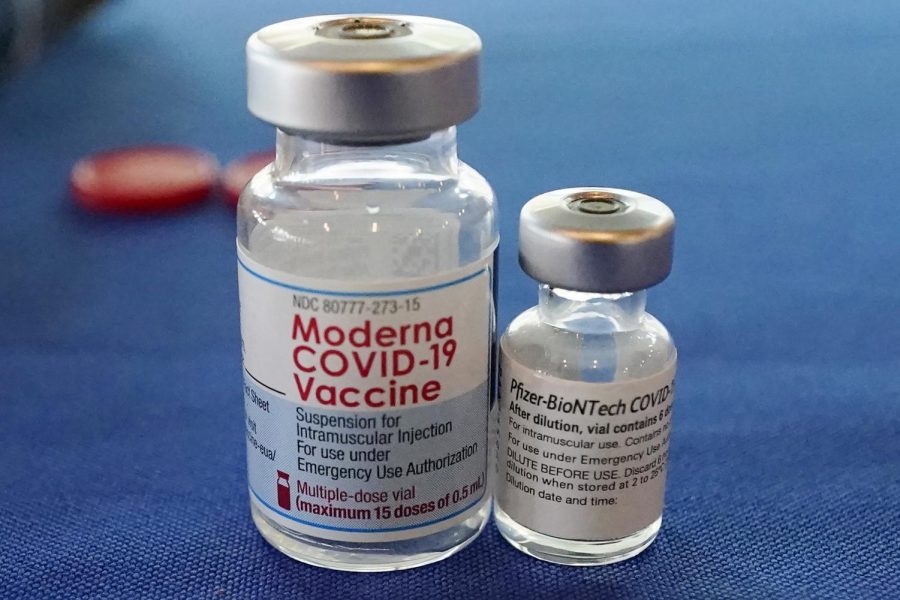Head-to-Head: JCU should have a COVID-19 vaccine requirement
This Sept. 21, 2021 file photo shows vials of the Pfizer and Moderna COVID-19 vaccines in Jackson, Miss.
Sep 27, 2021
Editor’s note: The opinion column is part of a faculty head-to-head series. Read the opposing perspective from Thomas Frazier and Anthony Tarescavage, faculty in the Psychology Department.
We strongly support the coronavirus (SARS-CoV-2) vaccination requirement, with medical and faith-based exemptions, for all JCU students, faculty and staff announced by President Miciak on Aug. 27, 2021. In his message, Miciak notes that the decision is “motivated by our strong sense of community and our mission to care for others,” and that “As members of the John Carroll community, we have a shared responsibility to keep one another safe. The most effective way to be together safely and provide the in-person experience that we all strongly desire is to be vaccinated.”
Infectious disease scientists and epidemiologists know that the only way to bring the pandemic to an end as soon as possible is through vaccination. John Carroll is joining hundreds of other institutions of higher education, government agencies, nonprofits and corporations in requiring vaccination to decrease coronavirus infections and protect their communities. While the primary function of vaccination is to prevent serious disease and death, there is growing evidence that the coronavirus vaccines in use in the United States substantially reduce the risk of infection. Furthermore, preliminary evidence from a small number of studies is consistent with infected vaccinated individuals being less likely to transmit the virus than infected unvaccinated people.
For many years, JCU has required students to provide documentation of vaccination against nine different infectious diseases. Specifically, the Mandatory Student Health Form states: “Certified documentation is required for the following: Measles-Mumps-Rubella (MMR), Varicella (chickenpox), Hepatitis B, Meningococcal Conjugate (meningitis) and Tetanus-Diptheria-Pertussis (Tdap).” There is no difference between the level of FDA approval of these vaccines and the recent FDA approval of the Pfizer SARS-CoV-2 vaccine.
School vaccination mandates in the US date to the 1850s. Nearly 170 years later, the vast advances in vaccine technology and rigorous testing requirements have only increased the safety and efficacy of modern vaccines. The coronavirus vaccines administered in the US are extraordinarily safe. Over 370 million COVID-19 vaccine doses have been administered to more than 200 million people in the US, and, to date, reliable research points to only three deaths possibly linked to these vaccines. Compare this with at least 680,000 deaths already caused by COVID-19, with daily deaths averaging over 2000 across the country.
A major claim of those arguing against vaccination requirements is that they violate personal autonomy. To be sure, personal autonomy is an important right, but like all rights, it is not absolute. Numerous US court decisions over decades have made clear that individuals do not have the right to spread serious infectious diseases such as measles, HIV/AIDS, hepatitis and tuberculosis. Many of these cases have relied on a 1905 Supreme Court decision, Jacobson v. Massachusetts, that governments may infringe on personal liberties for reasons of public health, arguing that no one has a right to inflict harm on others, in this case by transmitting a serious and potentially life-threatening infection. Similar to all public health regulations, such as food handling regulations, smoking bans and speed limits, all rules can be seen as infringing on personal autonomy, yet we accept these policies with an understanding that — although sometimes inconvenient — they are for the health and safety of the community as a whole.
In addition to protecting the health and safety of those living, learning and working at JCU, vaccination also protects our family members and the broader community with which our JCU faculty, staff and students interact. JCU is following the advice of experts that vaccination of all students, faculty and staff, combined with other interventions, provides the safest and best possible learning environment on our campus. We applaud President Miciak for making this decision and placing an appropriately high priority on the health and safety of the JCU community.
Jim Lissemore is Professor of Biology and Co-coordinator of the Program in Population and Public Health at John Carroll University. Medora W. Barnes is Associate Professor of Sociology and Co-coordinator of the Program in Population and Public Health at John Carroll University












